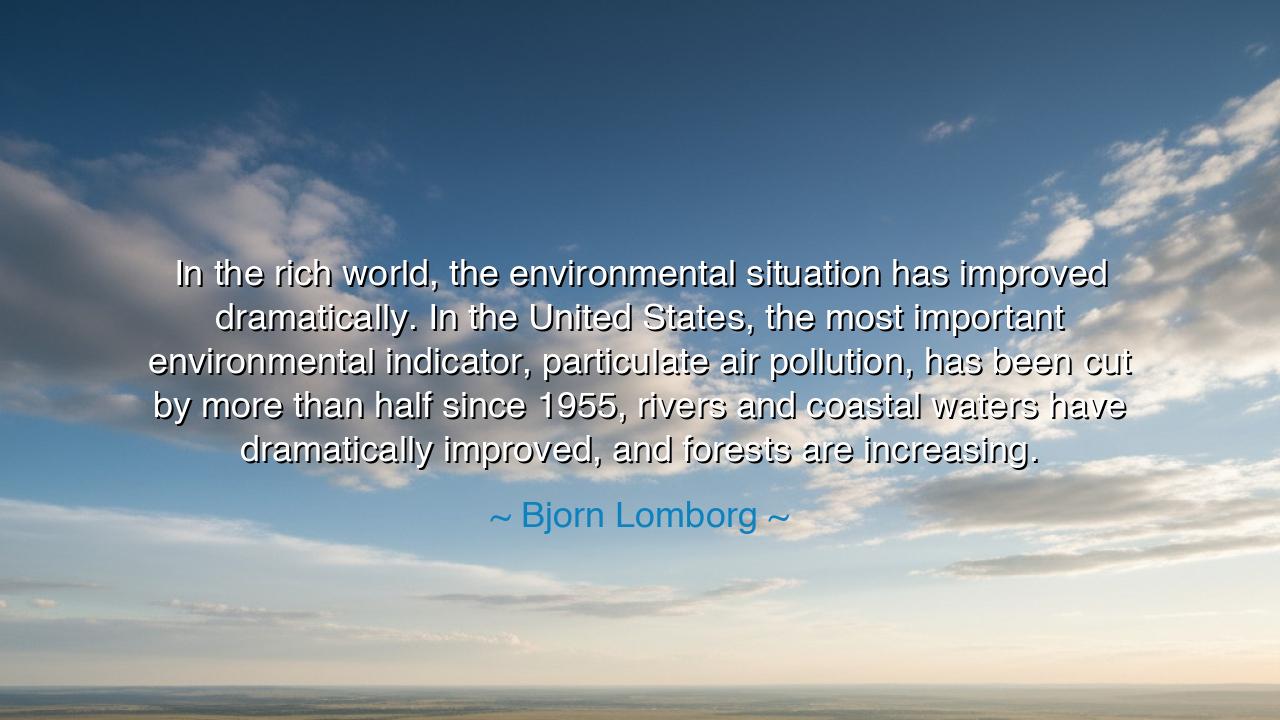
In the rich world, the environmental situation has improved
In the rich world, the environmental situation has improved dramatically. In the United States, the most important environmental indicator, particulate air pollution, has been cut by more than half since 1955, rivers and coastal waters have dramatically improved, and forests are increasing.






In the words of Bjorn Lomborg, “In the rich world, the environmental situation has improved dramatically. In the United States, the most important environmental indicator, particulate air pollution, has been cut by more than half since 1955, rivers and coastal waters have dramatically improved, and forests are increasing.” This utterance is no mere recital of statistics; it is a testament to the strange paradox of progress. For in ages past, man’s fire burned without restraint, his smoke darkened the heavens, and his waste poisoned the rivers. Yet from that darkness arose a resolve: to cleanse the air, to heal the waters, and to restore the forests once thought forever lost.
When Lomborg speaks of air pollution being halved, he invokes the triumph of vigilance over neglect. Once, the skies of great cities were choked with smoke so thick that day became as night. In London, the “Great Smog” of 1952 claimed thousands of lives in just a few days. In Pittsburgh, the noon hour was dim as twilight because of coal soot. Yet the law, the scientist, and the citizen together bent the arc of fate. Regulations on smokestacks, the shift from coal to cleaner fuels, and the spread of technologies like catalytic converters carved a path toward cleaner skies. Thus, what was once an unavoidable plague became a surmountable challenge.
Consider too the rivers and coastal waters that Lomborg praises. In the mid-twentieth century, the Cuyahoga River in Ohio caught fire, not once but many times, for its waters bore more oil than life. The sight of a burning river, absurd and tragic, stirred the heart of a nation. It was from such moments that the Environmental Protection Agency was born, and the Clean Water Act enacted. Today, where flames once danced upon the river, fish have returned and people paddle in waters once thought unredeemable. This story is no myth, but a living parable of humanity’s capacity to repent and restore.
The forests increasing are another signpost upon this path. Once stripped bare by axes and sawmills, many regions in the United States and Europe now see trees reclaiming their ancient dominions. Through replanting, conservation, and the decline of farmland in some regions, forests have marched back into the valleys and hills. This is not to say the battle is won—far from it—but it shows that renewal is possible where will and wisdom prevail. The forest is not only wood and leaf; it is memory itself, breathing the life of generations into the present.
Yet one must not hear Lomborg’s words and fall into complacency. For the tale of improvement in the rich world is not the tale of all the earth. In many lands, the air remains heavy with poison, the rivers thick with waste, and the forests vanish beneath axes wielded in desperation. The lesson of the quote is therefore twofold: first, that humanity is capable of healing its wounds; second, that such healing requires wealth, effort, and collective resolve. Without vigilance, the old wounds may reopen; without compassion, the poor may never share in the same renewal.
The wisdom of this teaching is clear: progress is possible, but it is not automatic. It comes when men and women rise up, when communities demand clean air for their children, when leaders heed the voices of both science and conscience. Like the ancient farmers who rotated their crops to preserve the fertility of the soil, modern people must rotate their habits, changing wasteful patterns into sustainable ones. The rivers and forests remind us that restoration is not a dream—it is a discipline.
Thus, dear listener, let this be your guiding action: cherish the air you breathe, protect the waters that sustain life, and honor the forests that shelter the earth. Plant a tree, for in that act you join the great renewal. Reduce waste, that the rivers may run clear. Support leaders and laws that place the health of the land above fleeting profit. For as the ancients taught, what you sow, you shall reap—and if you sow care for the earth, the generations yet unborn shall reap abundance.
Take heart, then, for Lomborg’s words carry not only statistics but a hidden flame of hope: that what was broken may be mended, what was polluted may be purified, and what was lost may once again be found. So walk with courage, guardians of the earth, and let your deeds echo across time as proof that humanity did not merely consume, but also healed.






AAdministratorAdministrator
Welcome, honored guests. Please leave a comment, we will respond soon